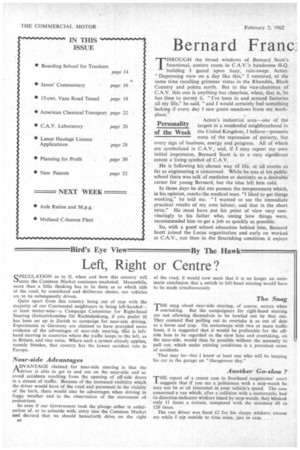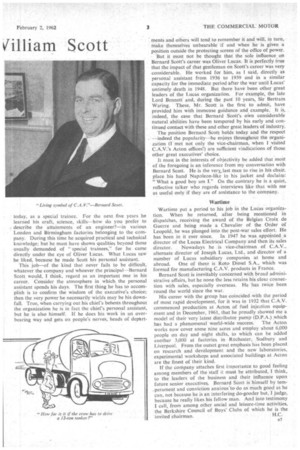Bernard Franci Villiam Scott
Page 40

Page 41

If you've noticed an error in this article please click here to report it so we can fix it.
THROUGH the broad windows of Bernard Scott's functional, austere room in C.A.V.'s handsome H.Q. building I gazed upon hazy, rain-swept Acton. "Depressing view on a day like this," I ventured, at the same time recalling grimmer vistas in the Rhondda, Black Country and points north. But to the vice-chairman of C.A.V. this one is anything but cheerless, when, that is, he has time to survey it. "I've been in and around factories all my life," he said, "and I would certainly feel something lacking if every day I saw green meadows from my. work
place." ... .
Acton's industrial area—one of the
Personality largest in a residential neighbourhood in of the Week the United Kingdom, I believe—presents none of the repression of poverty, but every sign of business, energy and progress. All of which are symbolized in C.A.V., and, if I may report my own initial impression, Bernard Scott is to a very significant extent a living symbol of C.A.V.
He is following his chosen way of life, at all events as far as engineering is concerned. While he was at his public school there was talk of medicine or dentistry as a desirable career for young "Bernard, but the idea left him cold.
In those days he did not possess the temperament which, in his opinion, marks the medical man. "I liked to get things working," he told me. "I wanted to see the immediate practical results of my own labour, and that in the short term." He must have put his point of view very convincingly to his father who, seeing how things were, recommended him to get a job as quickly as possible.
So, with a good school education behind him, Bernard Scott joined the Lucas organization and early on worked at C.A.V., not then in the flourishing condition it enjoys today, as a special trainee. For the next five years he learned his craft, science, skills—how do you prefer to describe the attainments of an engineer?—in various London and Birmingham factories belonging to the company. During this time he acquired practical and technical knowledge; but he must have shown qualities beyond those usually demanded of "special trainees," for he came directly under the eye of Oliver Lucas. What Lucas saw he liked, because he made Scott his personal assistant.
This job—of the kind that never fails to be difficult, whatever the company and whoever the principal—Bernard Scott would, I think, regard as an important one in his career. Consider the atmosphere in Which the personal assistant spends his days. The first thing he has to accomplish is to confirm the wisdom of the executive's choice; then the .very power he necessarily wields may be his downfall. True, when carrying out his chief's behests throughout the organization he is in fact the chief's personal assistant, but he is also himself. If he does his work in an overbearing way and gets on people's nerves, heads of deptirt inents and others will tend to remember it and will, in turn, make themselves unbearable if and when he is given a position outside the protecting screen of the office of power. But it must not be thought that the sole influence on Bernard Scott's career was Oliver Lucas. It is perfectly true that the impact of that gentleman on Scott's career was very considerable. He worked for him, as I said, directly as personal assistant from 1936 to 1939 and in a similar capacity for the immediate period after the war until Lucas' untimely death in 1948. But there have been other great leaders of the Lucas organization, For example, the late Lord Bennett and, during the past 10 years, Sir Bertram Waring. These, Mr. Scott is the first to admit, have provided him with immense guidance arid, example. It is, 'indeed, the ease that Bernard Scott's own considerable natural abilities have been tempered by his early and continued contact with these and other great leaders of industry.
The position Bernard Scott holds today and the respect —indeed the popularity—lie enjoys throughout the organization (I met not only the vice-chairman, when I visited C.A.V.'s Acton offices!) are sufficient vindications of those other great executives' choice.
It must in the interests of objectivity be added that most of the foregoing is an inference from my conversation with Bernard Scott. He is the vertlast man to rise in his chair, place his hand Napoleon-like in his jacket and declaim: "What a good boy am I." On the contrary he is a quiet, reflective talker who regards interviews like that with me as useful only if they are of assistance to the company.
Wartime
Wartime put a period to his job in the Lucas organization. When he returned, after being mentioned in dispatches, receiving the award of the Belgian Croix de Guerre and being made a Chevalier of the Order of Leopold, he was plunged into the post-war sales effort. He has been in it ever since. In 1947 he was appointed .a director of the Lucas Electrical Company and then its sales director. Nowadays he is vice-chairman of C.A.V., alternate director of Joseph Lucas, Ltd., and director of a number of Lucas subsidiary companies at home and abroad. One of these is Roto Diesel S.A., which was formed for manufacturing C.A.V. products in France, Bernard Scott is inevitably concerned with broad administrative affairs, but he none the less retains his closc connection with sales, especially overseas. He has twice been round the world since the war.
His career with the group has coincided with the period of most rapid development, for it was in 1932 that C.A.V. commenced production at Acton of fuel injection equipment and in December, 1961, that he proudly showed me a model of their very latest distributor pump (D.P.A.) which has had a phenomenal world-wide success. The Acton works now cover some nine acres and employ about 6,000 people on day and night shifts, to which can be added another 3,000 at factories in Rochester, _Sudbury and .Liverpool. From the outset great emphasis has been placed on research and development and the new laboratories, experimental workshops and associated buildings at Acton are the finest of their kind.
If the company attaches first importance to good feeling among members of the staff it must be attributed, I think, to the leaders of the business and their influence upon future senior executives. Bernard Scott is himself by ternperament and conviction anxious'to do as much good as he can, not because he is an interfering do-gooder but, I judge, because he really likes his fellow man. And into testimony I call, from among other social and leisure-time activities, the Berkshire Council of Boys' Clubs of which he is the invited chairman. H.C.




























































































































